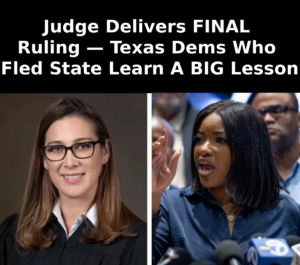
More than 50 Texas Democratic state representatives left the state in an effort to prevent a quorum and stall a Republican-backed congressional redistricting plan that aims to secure five additional U.S. House seats for the GOP.Attorney General’s Actions EscalateInvestigation launched: AG Ken Paxton began probing Powered by People, a political organization founded by Beto O’Rourke, for allegedly funding the travel and lodging expenses of the absentee Democrats—actions he frames as potentially violating laws on bribery, campaign finance, and abuse of office.Legal move to expel lawmakers: Paxton filed a lawsuit with the Texas Supreme Court seeking declarations that 13 of those absent Democrats have effectively abandoned their offices and should be removed.Court Blocks Nonprofit from Providing SupportTarrant County Judge Megan Fahey granted a temporary restraining order (TRO) blocking Powered by People from raising or spending money to support the missing lawmakers—including covering travel, accommodation, or daily fines. A full hearing is scheduled for August 19.Political Fallout and CounteractionsO’Rourke’s response: He filed a countersuit accusing Paxton of using his office to suppress dissent, and defending his organization’s work in voter rights and mobilization.Broader fallout: Governor Greg Abbott continues to issue special sessions and arrest warrants for absent lawmakers, while national figures—such as California Governor Gavin Newsom and former Speaker Nancy Pelosi—have voiced strong support for the Democrats.Democrats push back in court: Those targeted by removal efforts argue that quorum-breaking is a constitutional tactic recognized since the 19th century, and that courts are not the proper venue for expulsion, which should occur only via House action with a two-thirds vote.What It All MeansPolitical stakes are high: This confrontation is a pivotal moment in the battle over congressional representation and democratic norms ahead of the 2026 midterms.Legal actions are unprecedented: Suing to remove elected lawmakers for refusing to appear, and blocking political fundraising for them, marks a significant escalation in legislative conflict.Court rulings could shape precedent: The outcomes of both the TRO hearing (August 19) and the Supreme Court case seeking lawmakers’ removal could reshape how legislative standoffs are managed and regulated.